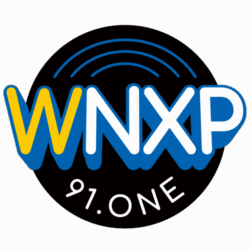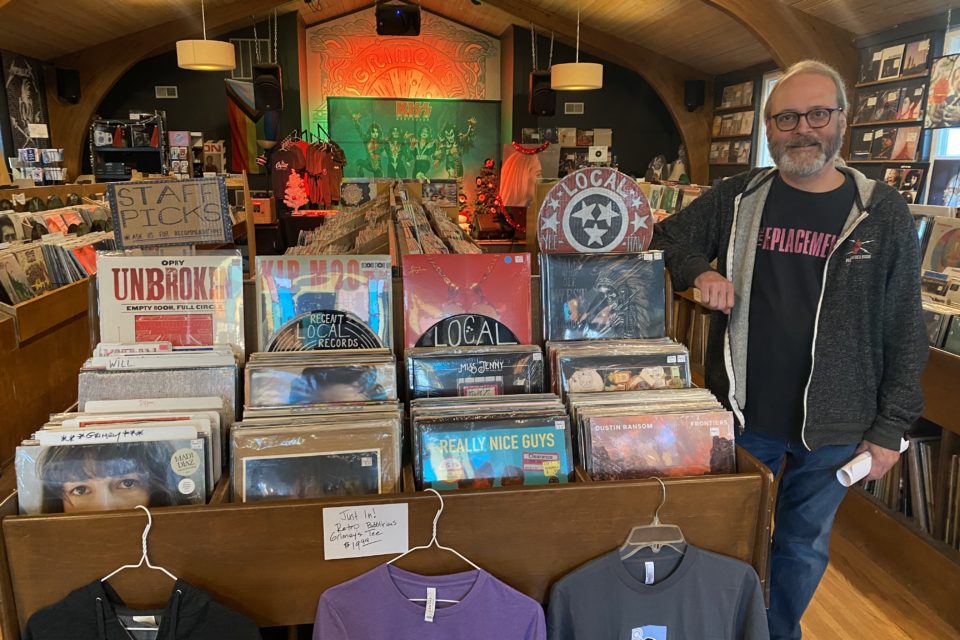The latest in our series Taking Stock of 2021, we dig into a year that was tough for record collectors and record sellers because of supply chain disruptions due to COVID-19 and a higher than ever demand for music pressed to vinyl. To learn about trends nationally and locally, I checked in with a Nashville authority on vinyl records, co-owner of Grimey’s New and Pre-loved Music, Doyle Davis. Davis told me how he and co-owner Mike Grimes pivoted the business model at Grimey’s, including the sales of signed records and also revenue generated from colorful murals on the side of the store. On a recent day that the store was closed, I got to sit down with Doyle inside Grimey’s and talk about the year in vinyl.
Doyle Davis: [Early in the COVID-19 pandemic] Lucinda Williams and Jason Isbell had new albums, and we got this idea to see if we can get them to sign them. They both live in the larger Nashville area, and so we reached out to management. Yes, they would. First up was Lucinda Williams, and we sold 200 of her new record signed. So already I sold 10 times as many records by having her signature on them and my store’s closed. And so we just had this idea of like, there are so many artists that live in Nashville. Why don’t we ask everybody we can? And right away we had a new model: get the records signed, put them on the website for preorders, take the orders and ship the records when we get them. And it just kept on working with pretty much everything. Even some of the local bands that signed records for us, we saw significant sales.
I swear a half or more of these packages were leaving the state, and that was an eye opener. These are not just my local Nashville customers having records shipped to their house, there are people buying records from Grimey’s everywhere. We realized that we had lots of people that had lived in Nashville and love Grimey’s and moved elsewhere. But we also had lots of people who’d been in Nashville on tourist visits and fallen in love with the store.
Celia Gregory: Are you seeing trends in Nashville mimic trends nationally or as far as what people are pre-ordering, what they’re purchasing, what they’re rushing in here for?
DD: I think our trends are pretty similar. I mean, we saw an awful lot of Nashville-centric, Americana-related stuff more so than other markets. So my number one best-selling album for 2021 at 489 copies sold is Kip Moore Live at Grimey’s. He signed them, too, and he’s very popular. We sold a good amount of these locally, but 70% of these or more were mail order sales outside of Nashville. Our number two bestselling title is Sturgill Simpson Cuttin’ Grass Vol. 2, which we sold a ton in the store, but that also was a huge preorder online. Number three is Kacey Musgraves star-crossed. Number four is Lambchop Showtunes, a special pressing. They did a color that was only available from Grimey’s in Nashville, one shop in the world and Kurt signed all the records. [Other top-sellers included] Yola [Stand for Myself], Taylor Swift Evermore, Phoebe Bridgers Punisher.
CG: With the increase in interest in vinyl — it’s not just the indie labels that are like, “This is cool.” This is not a niche market anymore — what changes have you witnessed this year as a seller of new and used records?
DD: Well, one thing I see right away is I’m stocking a lot more things only on CD because the vinyl is not ready till next spring. So you can also get a better idea of how labels prioritize their projects. When Kacey Musgraves can announce an album and she’s got plenty of vinyl ready to roll on the day it comes out digitally and Adele does the same thing, you know that these artists prioritized vinyl. Well, it would have to be the highest priority in their project. As far as it goes for us, it is just tons of dead spots in the store that I see — records I can’t stock because they’re just not available right now.
CG: Increased appetite plus people know now it’s a mad grab.
DD: Exactly. It’s like pouring kerosene on the fire or something, the fire of demand. So now when Kendrick Lamar Damn comes up as being available, we’re like, “Get 30, get 40. We’ll have it for a while because we probably won’t be able to reorder. It’ll be gone tomorrow.” And if I’m doing that, I assume every other shop that is thinking strategically now of how to source this product is doing the same thing. So it almost guarantees that it’s going to sell out that much faster.
CG: You walk the walk. You’re not just somebody putting the records out and selling them. You are an aficionado and a collector of records. So how has this experience with the delays and such been for you as somebody who really loves procuring new music and spinning it on your own radio show?
DD: I don’t see it as negative at all. Only in that it’s driving prices up on the used market. So records I’d like to pick up for $5 are going to cost me $15 now, but it’s a good thing. Demand for vinyl is an all-time high. I feel validated because I stuck with it the whole way. I was the last person among my crew to buy a CD player, and the only reason I bought one was because they quit making records on vinyl. I wanted to still buy new music.
The beginnings of Grimey’s is all rooted in vinyl. I just felt like there was nobody in Nashville doing vinyl like it should be done. And let’s do that at Grimey’s. We got a lot of vinyl and people started discovering Grimey’s as a place they could get this stuff. We prioritized it long before it came back, and demand has never been higher. That’s good.

